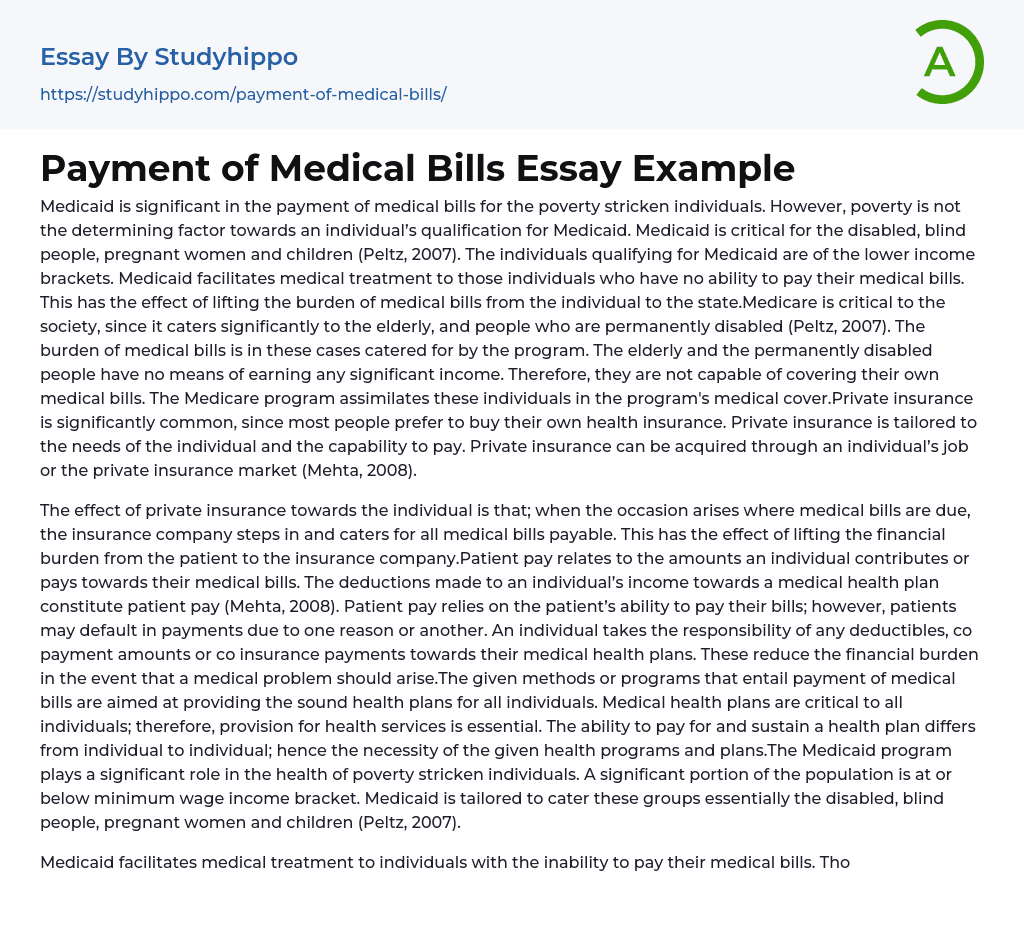Medicaid provides crucial financial assistance for healthcare expenses to individuals living in poverty. While eligibility criteria are not solely tied to income, it holds significant importance for disabled individuals, the blind, pregnant women, and children (Peltz, 2007).
Medicaid is a program that helps individuals with limited income who cannot afford their medical expenses, transferring the responsibility of healthcare costs from individuals to the state. In comparison, Medicare plays a crucial role in society as it primarily aids senior citizens and those with permanent disabilities (Peltz, 2007). It effectively handles the financial aspects of medical bills for these particular groups.
The Medicare program offers medical coverage for elderly and permanently disabled individuals who cannot afford their own healthcare expenses. Meanwhile, private insurance is a favored option as people prefer to purchase personalized health insurance that suits their needs
...and financial capability.
Private insurance can be acquired through an individual's employer or the private insurance market, providing complete coverage for medical expenses. This relieves individuals of financial responsibility and transfers it to the insurance provider. Patient pay encompasses the amount individuals contribute towards their medical bills, including deductions from their income for a healthcare plan.
The payment patients make for their medical bills is based on their ability to pay, but sometimes they are unable to do so for various reasons. Patients have the responsibility of paying deductibles, co-payment amounts, and co-insurance payments for their medical health plans in order to lessen the financial burden if a medical problem arises. These methods or programs aim to provide comprehensive health plans for everyone. The accessibility of health services is crucial for all individuals, but the affordability and maintenance of a health plan
differ from person to person. Therefore, these health programs and plans are necessary.
The Medicaid program holds particular importance for individuals living in poverty as it greatly improves their health.
The minimum wage income bracket encompasses various groups of individuals, including disabled individuals, blind people, pregnant women, and children (Peltz, 2007). Medicaid seeks to assist these groups by offering medical treatment for those who cannot afford their healthcare expenses. By transferring the responsibility from individuals to the state, this program ensures fair access to medical services for everyone.
The state has a duty to ensure the well-being of its citizens and prevent the marginalization of disadvantaged individuals. In order to address the healthcare needs of senior citizens, who are more prone to medical issues as they get older, the Medicare program provides benefits. To be eligible for this program, individuals must either be over sixty-five years old or have a permanent disability (Peltz, 2007). The state recognizes that elderly individuals often rely on inadequate pension programs to cover their healthcare expenses.
Medicare ensures that the elderly and permanently disabled individuals have a medical health plan that relieves their burden. Private insurance, on the other hand, aims to facilitate medical care for customers in times of need. Private insurance is profit-oriented and requires prompt payment of premiums from clients. When terms of the policy and laws are met, the private insurance company pays medical bills on behalf of the individual. Private insurance is designed based on individual needs and ability to pay, covering all medical expenses for the policy holder and reducing the patient's financial burden. The Patient pay system ensures that eligible individuals contribute appropriately to their medical programs.
Mehta
(2008) defines patient pay as the deductions made from an individual's income for a medical health plan. Its purpose is to make the patient accountable for their medical expenses. In cases where payments are not fulfilled, patients may face discharge or transfer. Patient pay shifts the responsibility to the patient when payment obligations are not met. Each health program and plan aims to relieve individuals of financial strain caused by medical bills, operating within their respective laws and regulations.
The common agreement among all programs is to deliver medical services to their target subscribers. This guarantees that medical services are accessible to everyone, regardless of time and location.
- Interview essays
- Job Interview essays
- Career Choice essays
- Career Goals essays
- Portfolio essays
- Community Service essays
- Work-Life Balance essays
- Performance Appraisal essays
- Job essays
- Employee essays
- Skills essays
- Service essays
- Vocation essays
- Internship essays
- Work Experience essays
- Duty essays
- Dream Job essays
- Career Plan essays
- Money essays
- Financial Accounting essays
- Market Segmentation essays
- Supply And Demand essays
- Purchasing essays
- Forecasting essays
- Legacy essays
- Bank essays
- Corporate Finance essays
- Financial News essays
- Financial Ratios essays
- Financial Services essays
- Free Market essays
- Shareholder essays
- Personal finance essays
- Equity essays
- Financial Crisis essays
- Banking essays
- Credit Card essays
- Currency essays
- Debt essays
- Gold essays
- Loan essays
- Enron Scandal essays
- Foreign Exchange Market essays
- Investment essays
- Venture Capital essays
- Stock Market essays
- Retirement essays
- Donation essays
- Net Present Value essays
- Income Statement essays




